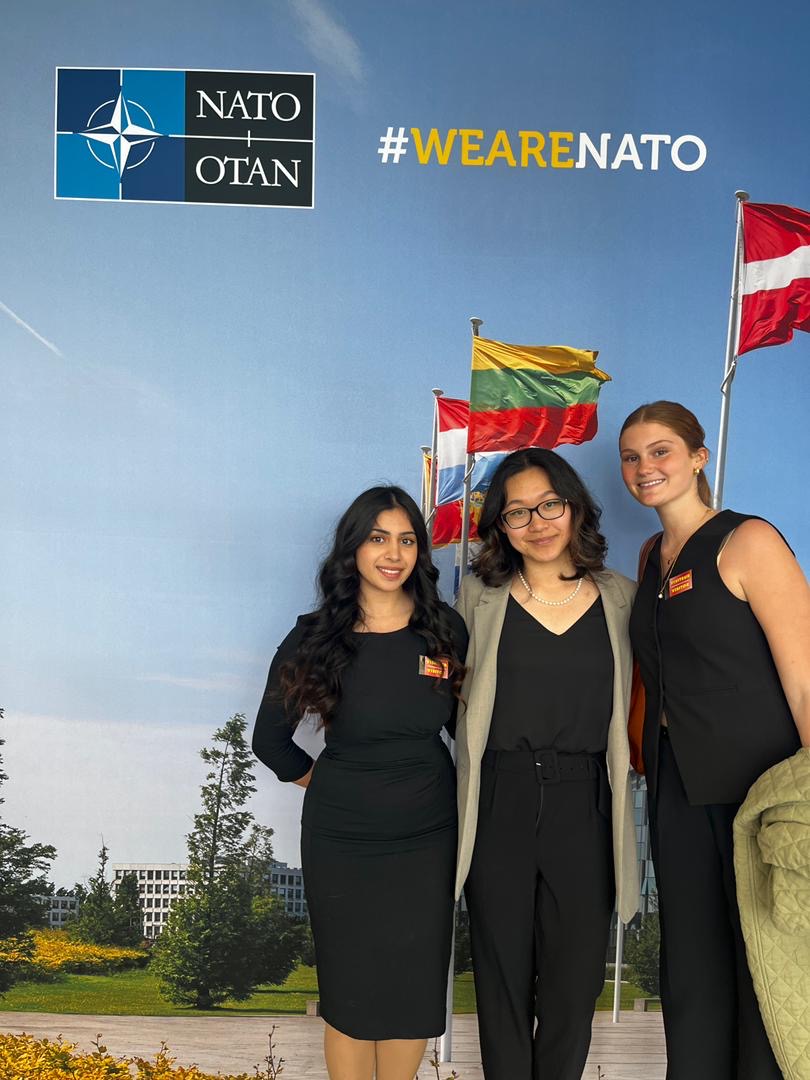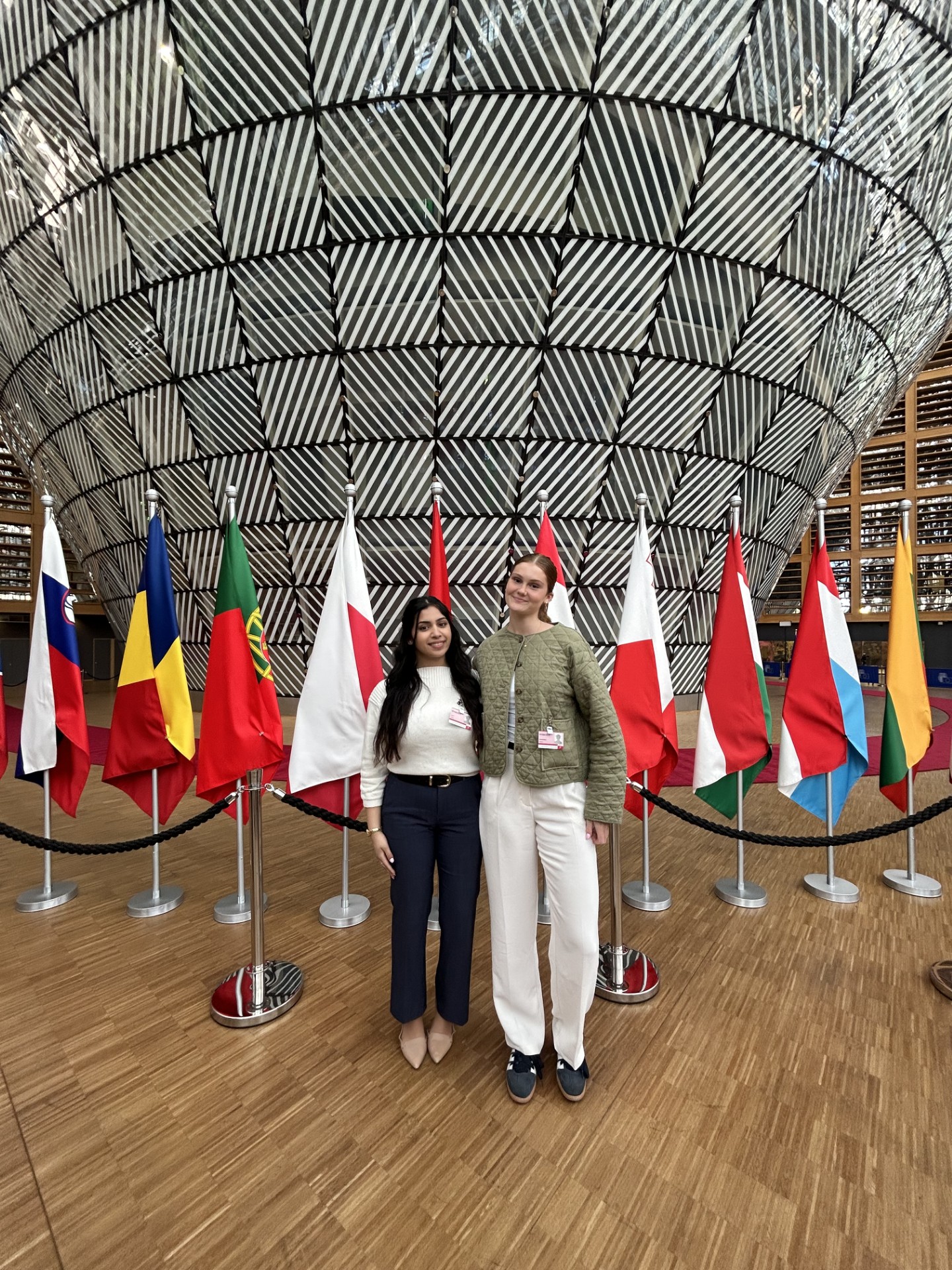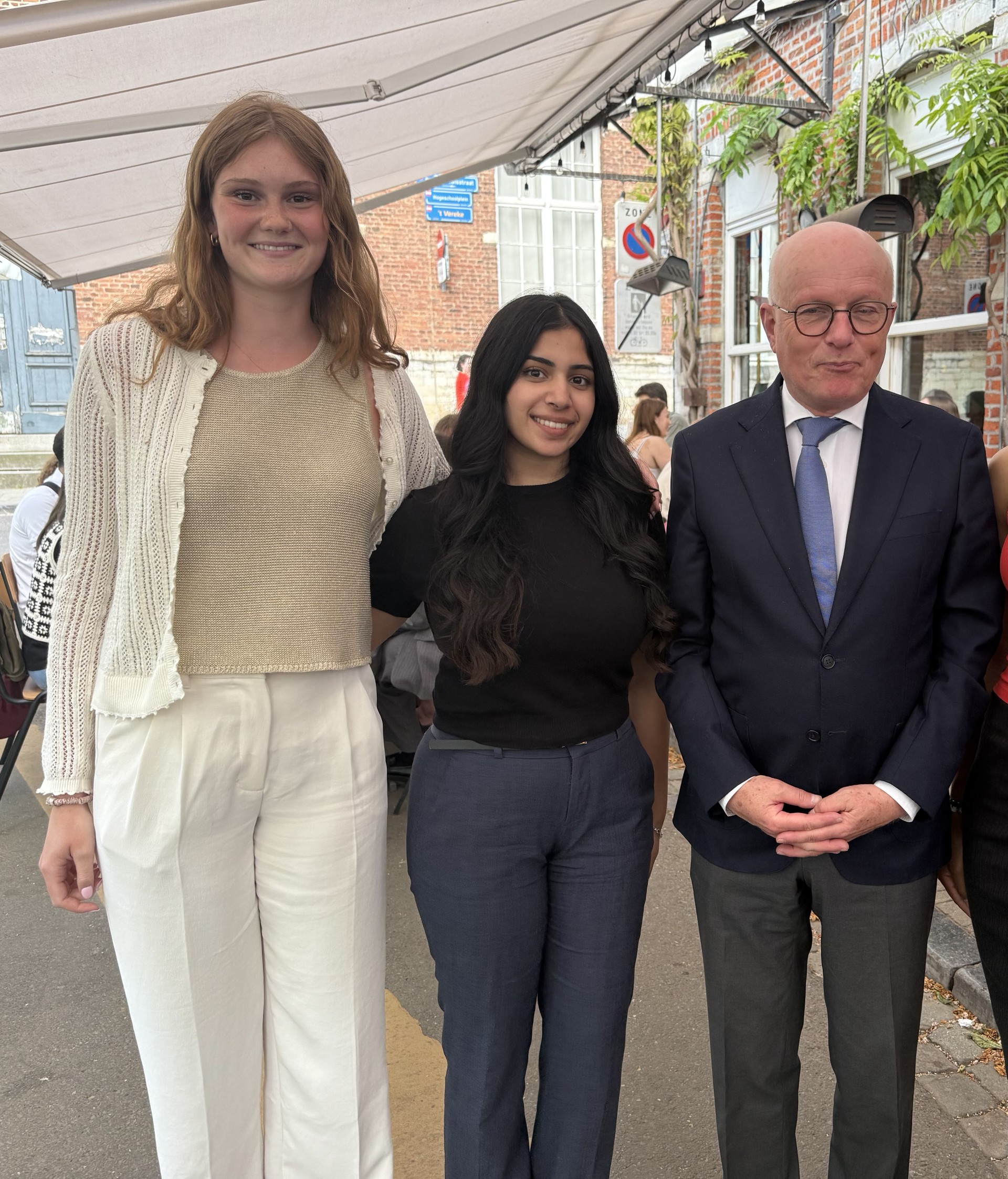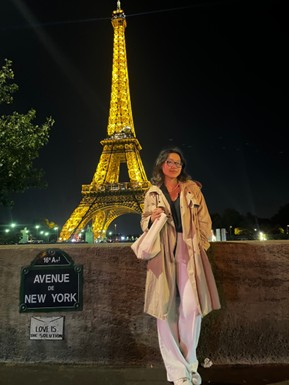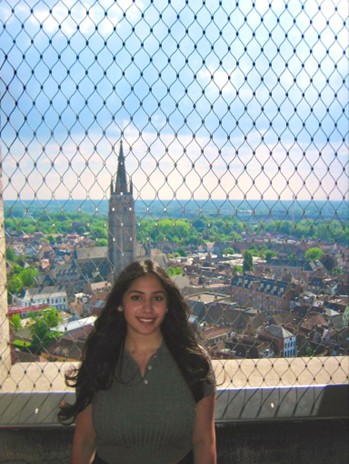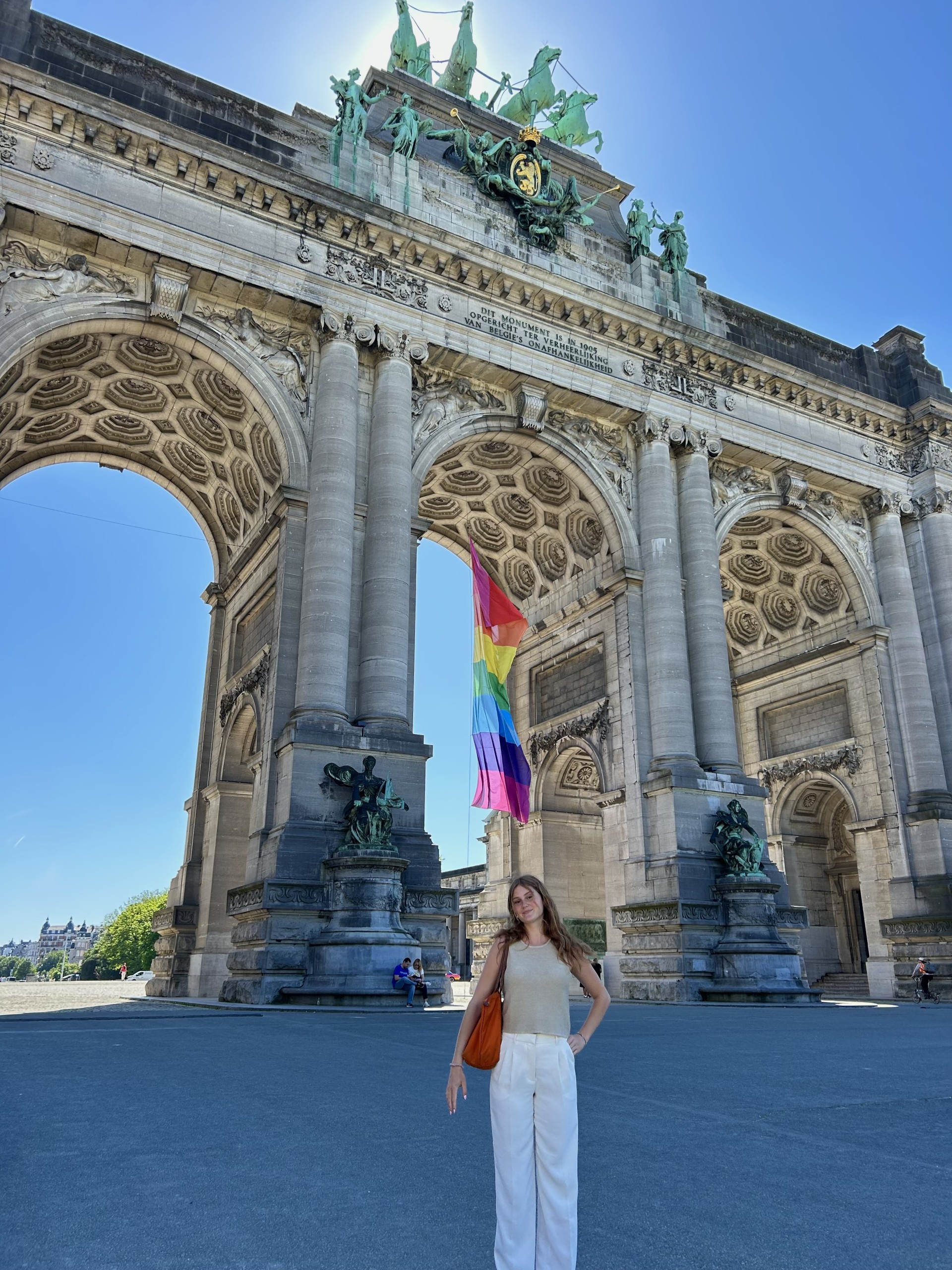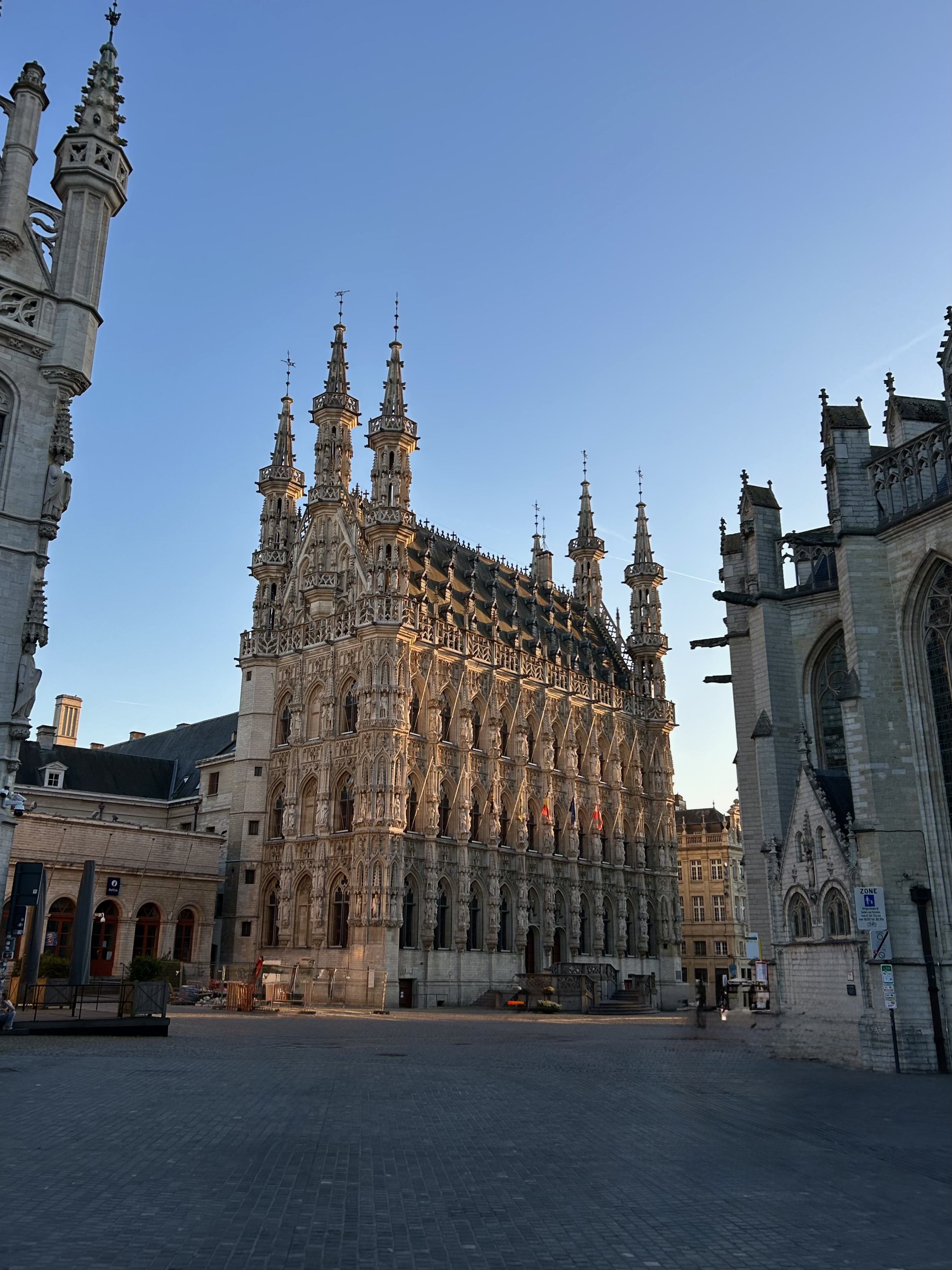Search Website
Experiences Studying Abroad
Below are the accounts of some of the exchange experiences of students in the program.
2025
Spending a semester abroad at Erasmus University Rotterdam was one of the most rewarding experiences of my undergraduate studies in IR. Living in the Netherlands, at the crossroads of diplomacy, trade, international governance, immersed me in cross-cultural learning that enriched both my academic and real-world understanding.
While fulfilling UWO’s IR module requirements, my courses at the Erasmus School of Social and Behavioural Sciences (ESSB) offered transformative experiences that deepened my understanding of IR. Immersed in a globally oriented academic environment, I gained new perspectives through daily interactions with a diverse student and faculty body. Adapting to a different educational system and engaging in discussions shaped by varied cultural and regional contexts challenged me to think critically and globally. I also had the opportunity to engage directly with real-world policy environments; visiting the Dutch Ministry of Foreign Affairs to explore development budgeting, as well as presenting organizational reform proposals to influential figures in Dutch law enforcement, which grounded my academic learning in practical day-to-day affairs. These moments were made even more impactful by the genuine interest of peers and professors in Canadian perspectives, allowing me to contribute meaningfully to global discussions and reinforcing the value of international knowledge exchange.
Outside the classroom, I traveled to over 20 cities across 12 countries. Opportune with travel through some of the oldest and most historic regions in the world presented me with history and reflection in almost every experience. From seeing the Peace Palace in The Hague to going to France and standing in the Hall of Mirrors, the site where the Treaty of Versailles was signed, my travel experiences brought IR history and theory to life. Beyond sightseeing, constant learning was everywhere. When visiting the beautiful island of Cyprus for example, I experienced its rich culture, as well as the lived and ongoing outcomes of historical tensions and conflict. It served as a powerful reminder of both the achievements and critical limitations of international peace efforts, which I have studied in theory, and which have made possible the very privilege of recreational travel like this.
In Rotterdam, reflection was part of daily life – from memorials to the embedded red lights in the sidewalks marking the WWII bombing line, there were constant reminders of the city's history. With Canadian forces having played a key role in the Netherlands’ liberation, celebrating Dutch Liberation Day on May 5th was a poignant reminder of our shared history. Even just casual conversations with Uber drivers or bank tellers consistently revealed a warm recognition of Canada, underscoring the lasting impact of strong international relationships.
With every class taken, destination traveled, and even simple step taken, I was reminded how deeply history shapes the world and how vital contemporary International Relations is; not just on the global stage, but in the everyday lives affected by development aid, regional dynamics, and many more of the very topics we study. While research essays are also important, there is no better way to enrich your learning and understanding of IR than firsthand embarking on an international experience of your own. Studying abroad challenged me to adapt, connect, and think globally in ways that no textbook or lecture alone could offer.
For any IR student considering an international experience: go. You will return with fresh insight, lifelong friendships, and a deeper appreciation for the field you are studying.
 |
 |
(In front of The Peace Palace in the Hague, Netherlands - an international law administrative building that houses the International Court of Justice, the Permanent Court of Arbitration, The Hague Academy of International Law, and the Peace Palace Library)
 |
 |
(Taken in the Hall of Mirrors in the Palace of Versailles, in France - this was the site where the Treaty of Versailles was signed on June 28, 1919, officially ending World War I)
 |
(Arc de Triomphe, Paris France - Memorial to honors those who fought and died for France, particularly in the French Revolutionary and Napoleonic Wars, and features the Tomb of the Unknown Soldier from World War 1)
 |
(Hungarian Parliament Building, in Budapest Hungary)
 |
(Inside Grand Hall of the Austrian National Library, Vienna Austria - one of the oldest and most beautiful libraries in the world)
 |
(Taken just outside of Paphos, Cyprus)
 |
(Kings Day Celebration In Amsterdam, Netherlands)
 |
(Taken on my walk to campus in Rotterdam, Netherlands)
Cecilia Cai, Italy
There’s an idiom I learned early on. To “hang your hat” somewhere means to make it home. For me, that place became Milan for four months. It was the first city many of us got to experience fully on our own terms after turning 18.
In June, 2025, I wrapped up a fulfilling, chaotic, and just incredibly fun semester abroad at Università Bocconi, as part of the Ivey Business School at Western University's HBA Exchange Program. When I ranked Italy as a top choice, it was both an academic and a personal decision. As a dual-degree student in International Relations and Business, I wanted a setting that spoke to both sides: a country at the intersection of European integration, Mediterranean migration, and distinctive local identities; and a university with deep ties to the worlds of finance, law, and fashion.
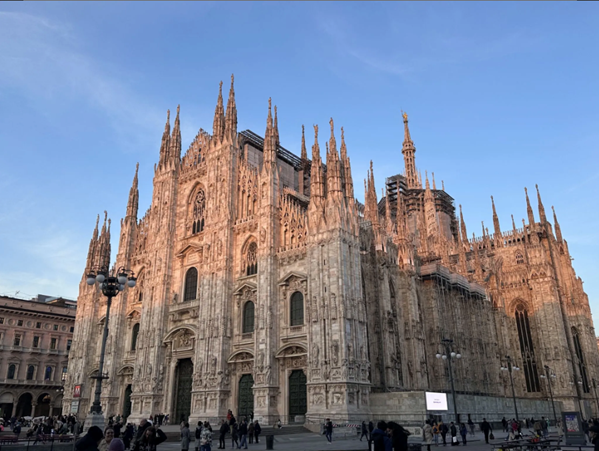
Duomo di Milano
Academic Life
The academic system was a big shift from Western’s classrooms. I took courses in European IP & Data Law, FinTech, International Relations, and Management of Fashion Companies. In these classrooms, we got a taste of Bocconi’s very strong ties with industry professionals. Guest lecturers came in from neobanks like Revolut, fintech firms like Klarna, consultancies such as Accenture, and fashion powerhouses like Levi’s, Moncler, Stone Island, and Bvlgari; all showing us how class-taught theories translate into real-world practice. Grades were out of 30, with the elusive 30 e lode for exceptional work, and exams came in three waves. One at the end of May, one in June-July, and whatever is not done is completed in the September of the next school year.
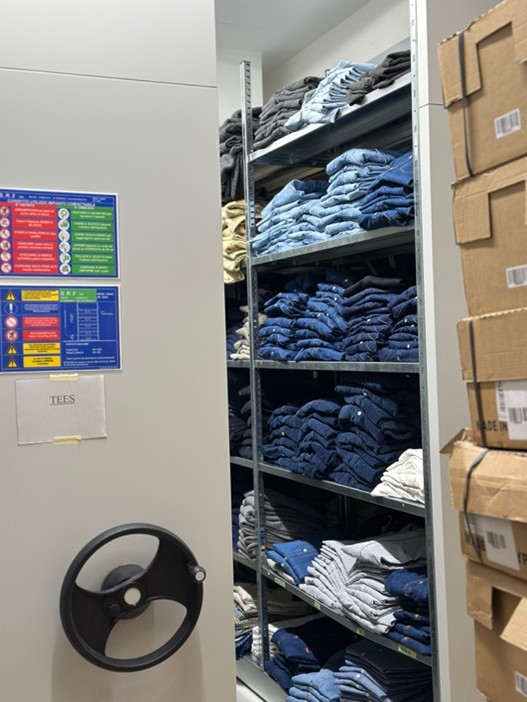 |
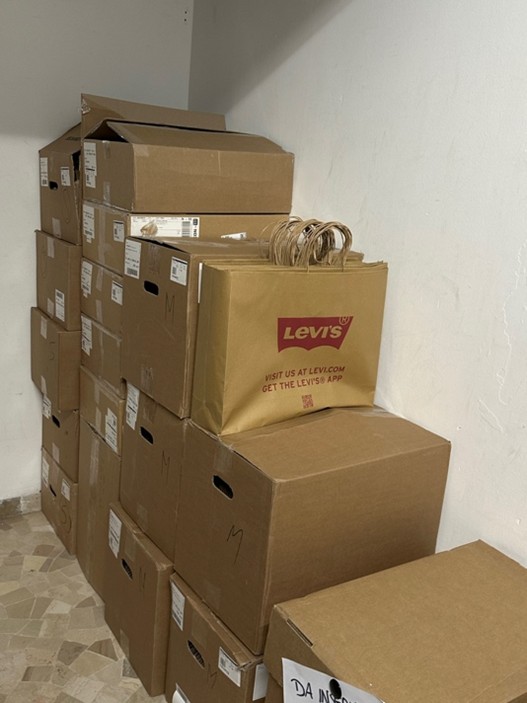 |
Levi’s Back Storage Area
At Bocconi, one of the first quirks you learn to navigate is the “attending” versus “non-attending” student system. To qualify as an attending student in most classes, you need to be present for at least 75% of lectures. To be “present”, you would need to check in on the Bocconi Agenda app right before class starts (or anytime during the lecture) so the system logs your attendance. Attending status means you’re following the professor’s live course, including lectures, class discussions, midterms, group projects, and all. Your final grade might be a mix of these continuous assessments plus a final exam that covers the material taught in class. Non-attending status is for students who either don’t participate in the live course or wants to only take the 100% weighted exam. In that case, you’re tested on an expanded syllabus, often with extra readings or different textbooks, and your entire grade depends on a single, all-encompassing exam. Most exchange students I met opted for the attending route — not just because it spreads the workload out, but because it gave us a reason to show up and engage with the material. All in all, students determine whichever status they want to be in for each class strategically. Some weigh their travel plans and decide they’d rather go non-attending for a course that is incompatible with their learning style; others commit to attending so they can learn the material consistently without cramming for one high-stakes exam. The nice thing is that Bocconi gives you plenty of flexibility — you’re not locked into the same status for all your courses, and you can tailor the approach to your schedule, study habits, and frankly, your risk tolerance.
Another one of the most novel parts of the semester was working on group projects that brought together students from every corner of the world. Bocconi’s international community is huge, and I found myself collaborating with Italian classmates and peers from the U.S., UK, France, Norway, Korea, Spain, and beyond. What stood out to me was the diversity of passports around the table and how studious and rigorous full-time students are. The diversity shined through in that there are various ways people approached teamwork. It was fascinating to see how these habits that were shaped by education systems and cultural norms, played out in the flow of a project. At first, it was a challenge to balance the different styles, but by the end I found myself appreciating how much richer the outcomes became when we leaned into those differences rather than trying to smooth them over.
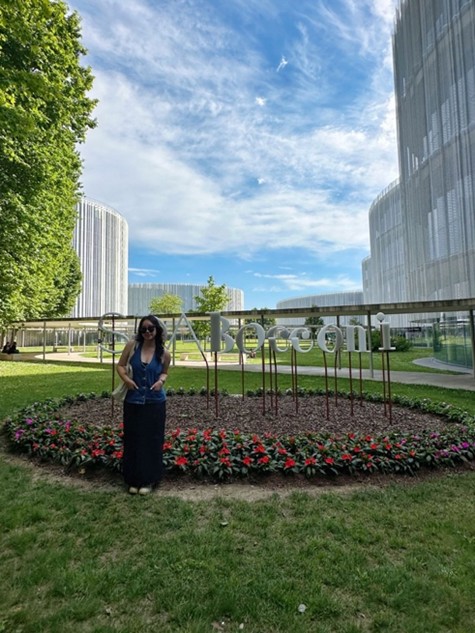 |
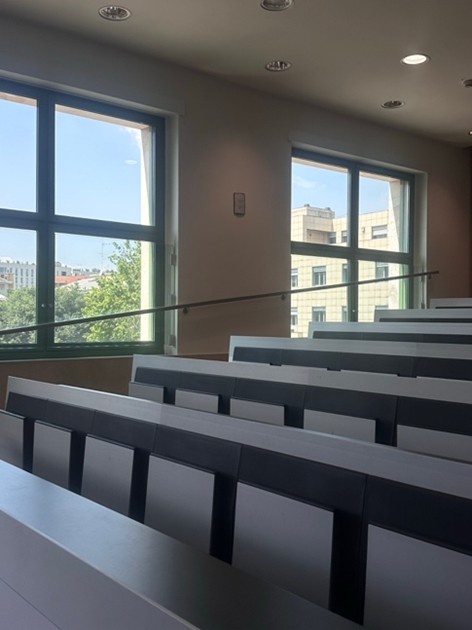 |
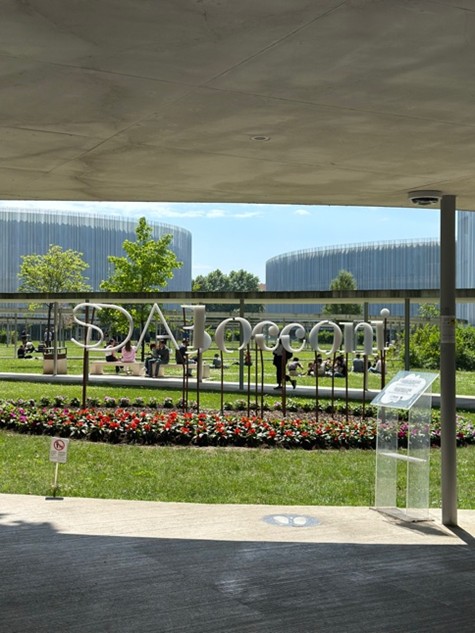 |
Bocconi Campus
Campus Rhythm
Campus life at Bocconi had its own rhythm. Luckily, a big number of us incoming exchange students stayed at a home-like apartment complex named Aparto Giovenale, which is within 5-minutes of walking distance from the Bocconi campus. This enabled us to roll out of bed for class, go to post-lecture aperitivos that typically stretched until dinner, or wander over to whatever event was happening each week (typically there’s always something every week). Election week, for example, brought on a show between two student government parties (Astra vs. Blab) each hosting various events to convince students of their campaigning abilities. Astra set up musical booths with DJs outside the Dhalia café for a whole week and Blab had the “Blab to the Park” event at Parco Alessandrina Ravizza, which turned into a full-on social scene. Aparto is also where we made the most friends with people from each corner of the world. There are 10 nationalities on my floor alone out of the 11 of us. What’s for dinner and who’s cooking in the kitchen quickly became a jeopardy game we look forward to outside of studying.
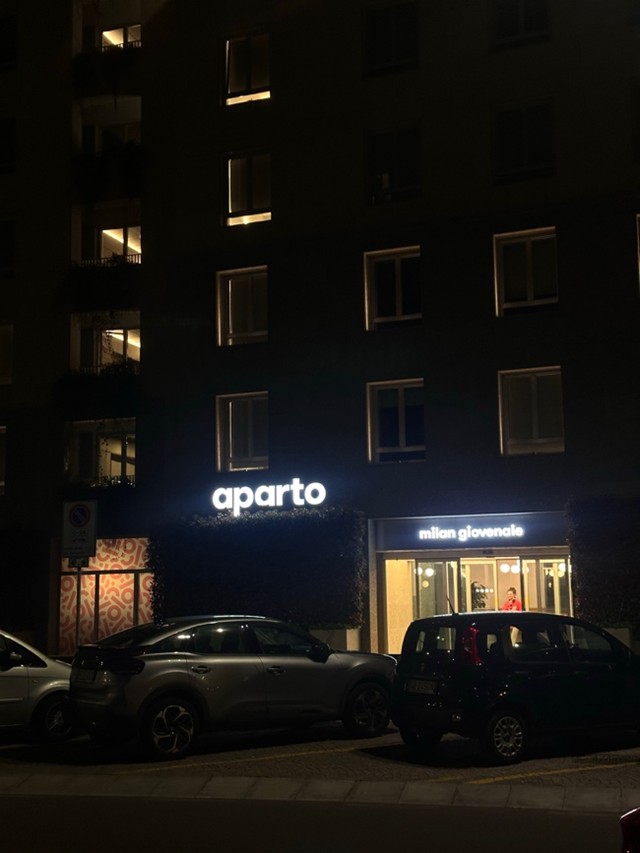 |
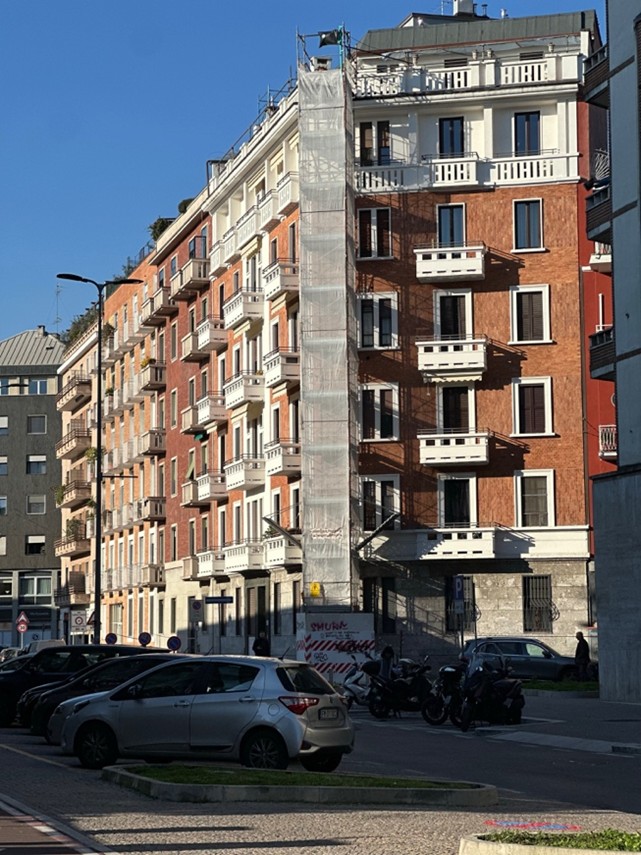 |
Aparto Giovenale & Neighbourhood
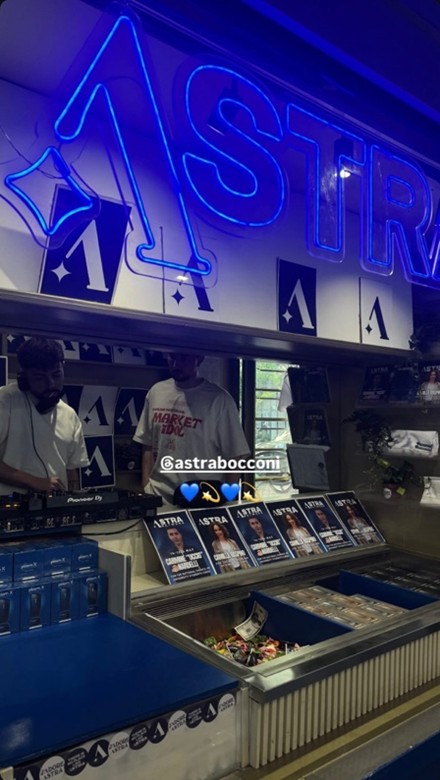 |
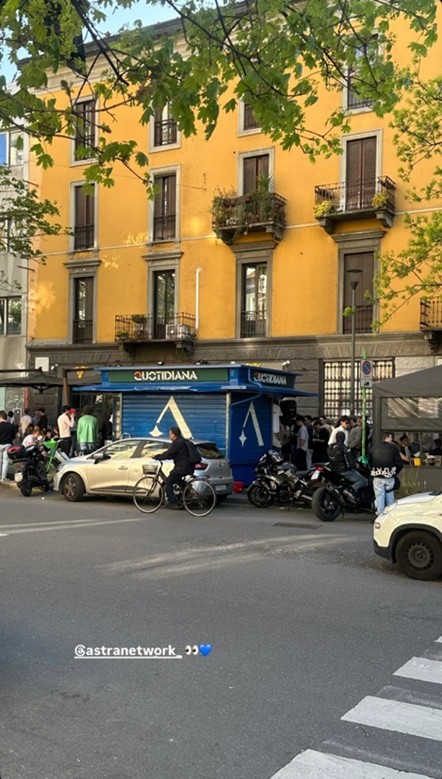 |
Astra Musical Booths
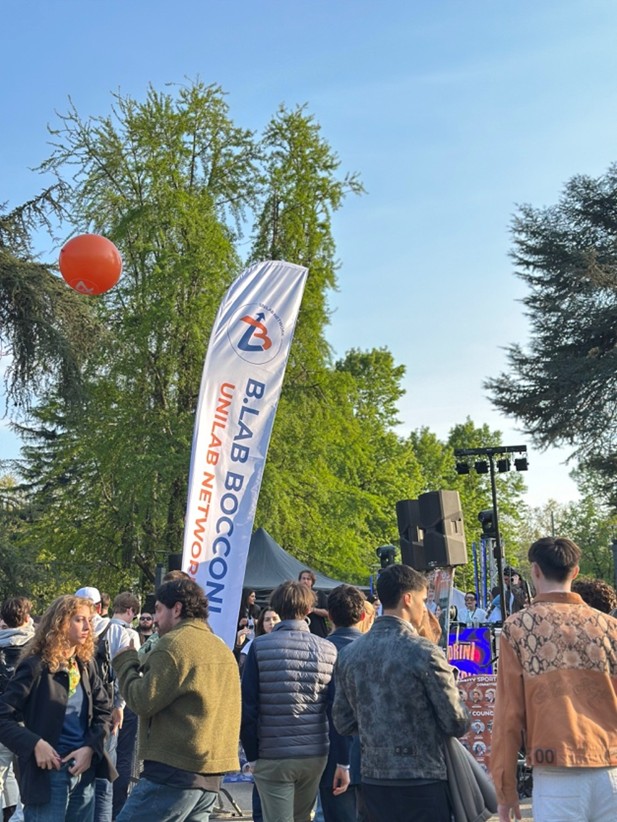 |
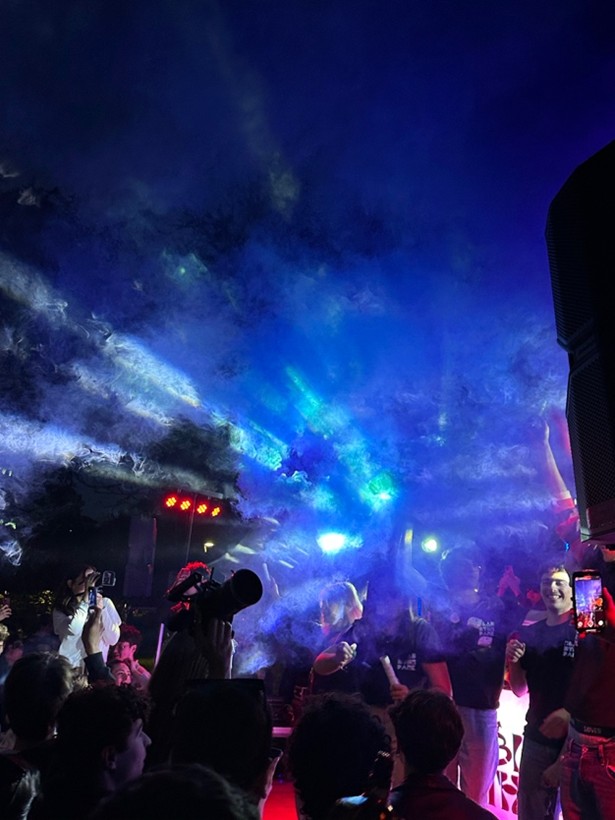 |
Blab to the Park
Life outside of campus is also colourful. Tuesday beers at Officine Sbiellate (our go-to spot across from the apartment) became a tradition. Thursdays belonged to Navigli, where the crowd at King’s Pub never disappointed. However, come exam season, students would often line up at libraries and study seats for study marathons that always dissolved into late-night kebab runs or last-minute Conad snacks, a routine that felt eerily like the 7/11 trips on Western Road back in London.
Exchanging at a school in the center of Milan gave me front-row access to global conversations and events such as the LVMH Conference 2025 and the NEXT Milan Forum. For NEXT, students were in the same room with WTO leaders, Nobel laureates, and youth delegates, discussing everything from multilateral trade reform to AI governance and climate transitions.
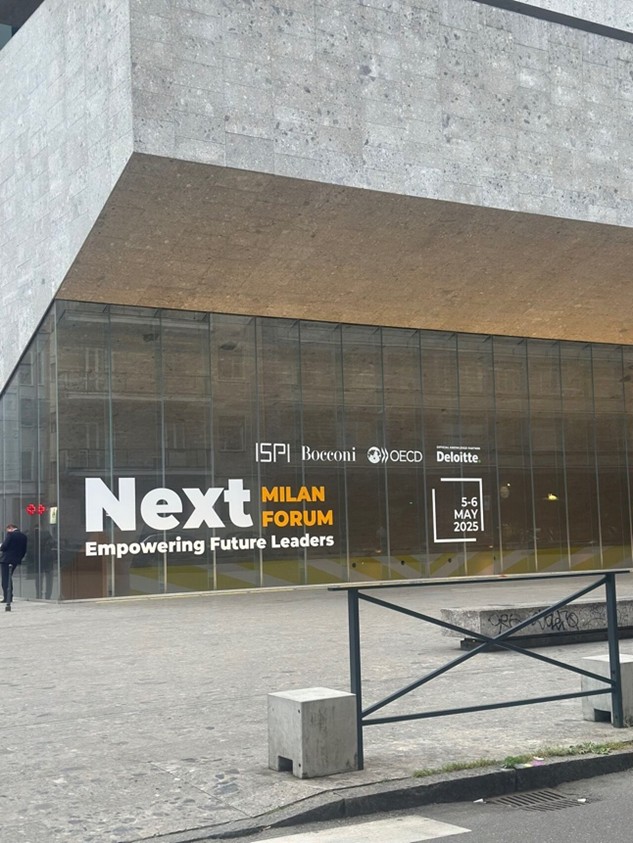 |
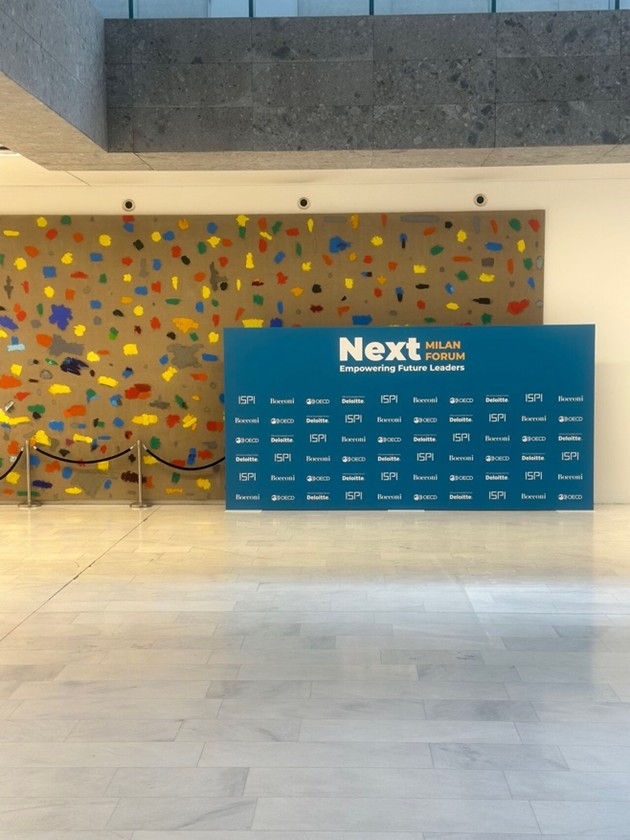 |
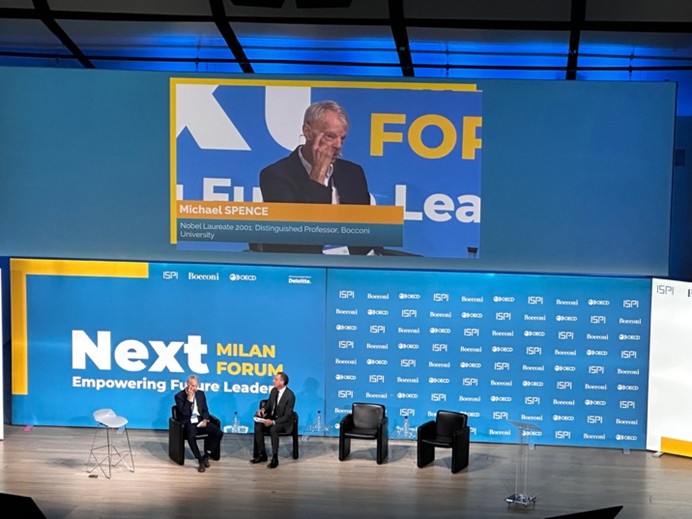 |
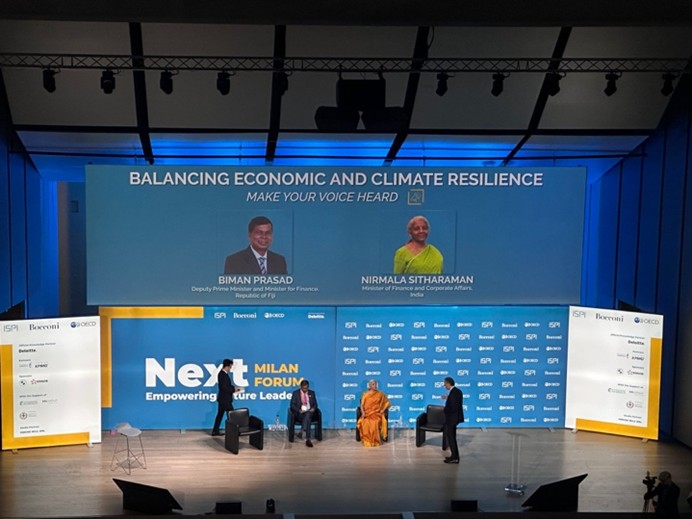 |
NEXT Milan Forum 2025
Lifestyle & Culture
My first impression of Milan is the saying that “it is not a city for tourists”. Life here runs on its own timeline, and it took us some trial and error to slip into it. Grocery shopping was an adjustment, even ordering coffee came with its own learning curve. There’s nothing like accidentally asking for a cup of milk instead of a latte at 4 p.m. to mark yourself as a cliche tourist.
In our free times, we wandered through the Duomo area, Brera’s streets, and spent way too much time vintage shopping at Humana and DMAG. Other days were about sunbathing with friends at Parco Sempione behind the Sforzesco Castle or looking at artworks in Pinacoteca Ambrosiana. Halfway through the semester, we got to see Milan in its full glamour, with pedestrian’s on-point and individualistic outfit during Fashion Week and Design Week filling the city with strange and creatives installations. The Duomo turned into a massive block party after Inter Milan won the champion’s league semi-final, showcasing the raw European passion for football. And then there was racing, a key composition of Italy’s national identity. I made the trip to see an F1 in Imola and the GT World Challenge Europe in Monza, where fans welcomed me into their race week routine by sharing snacks, blankets, and loud cheers every time a car flew past.
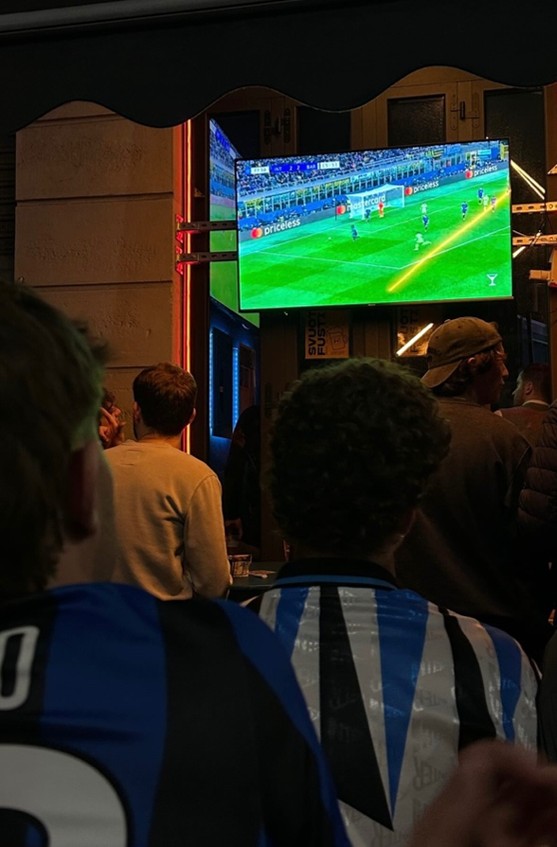 |
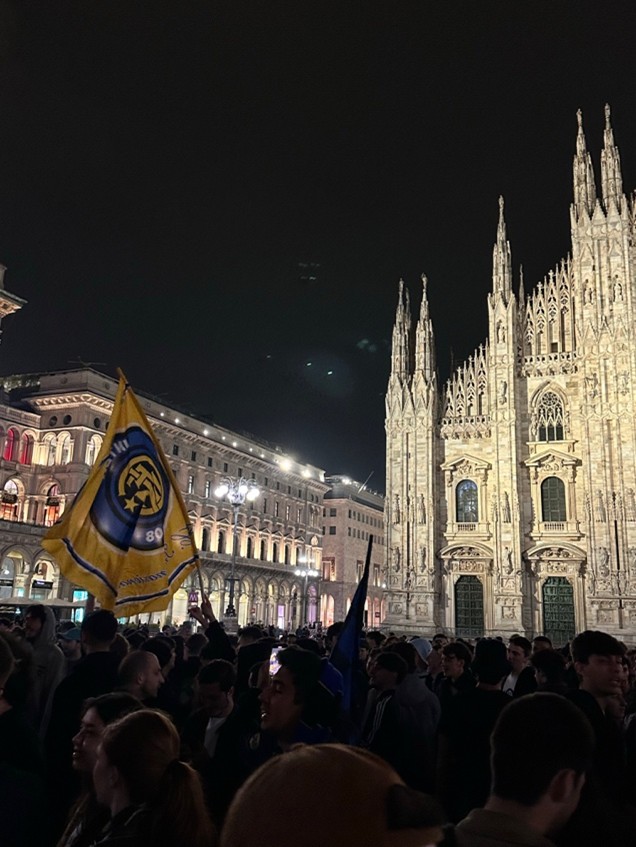 |
Champions League Semi-Finals
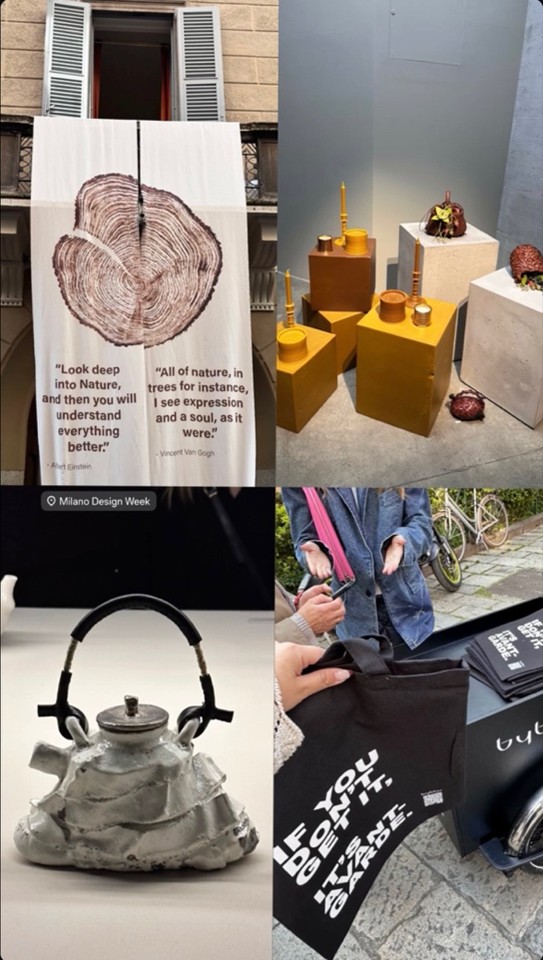 |
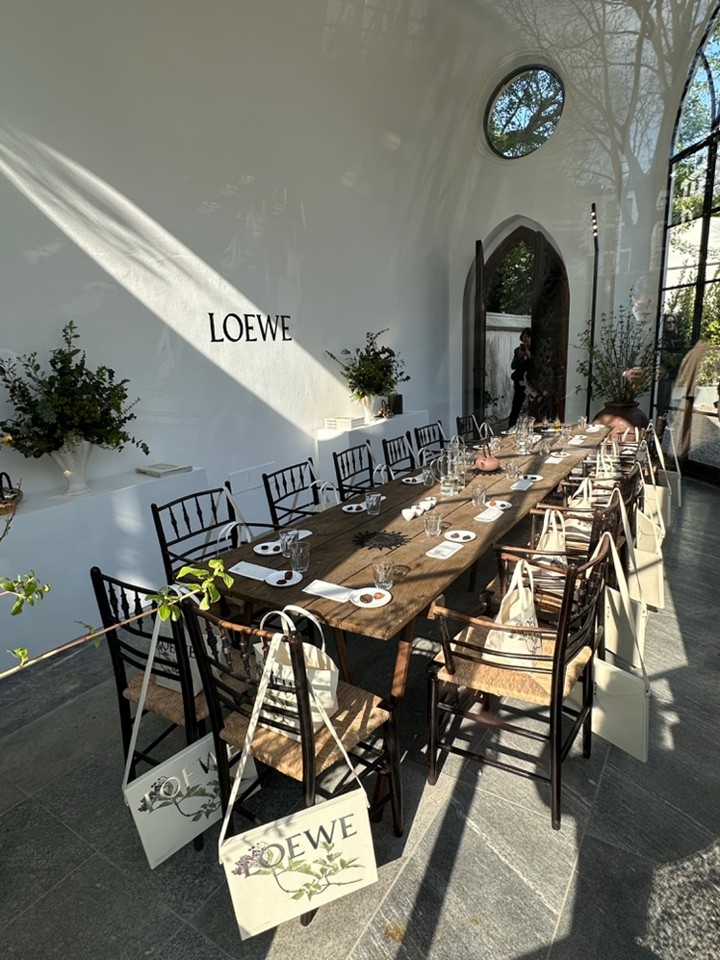 |
2025 Milan Design Week
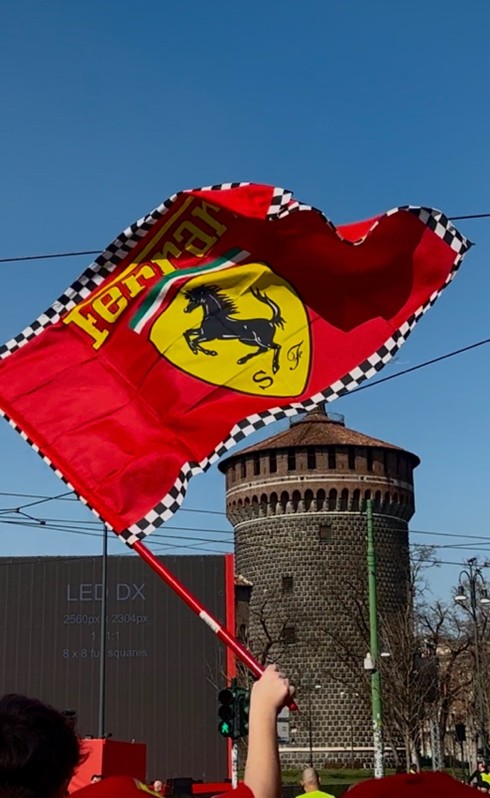 |
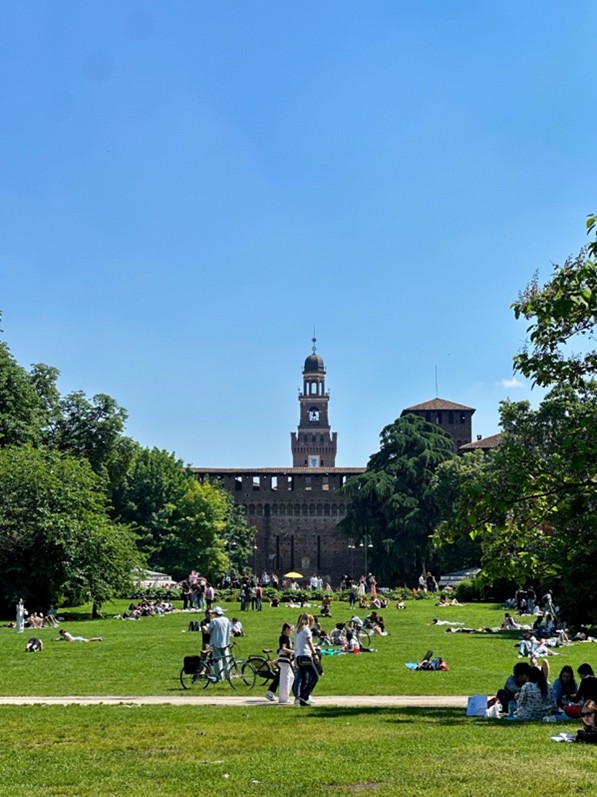 |
Ferrari Event at Sforzesco Castle & Parco Sempione
Living here also brought out the less polished side of the city. Applying for the permit of stay with the local bureaucratic offices was every exchange student’s nightmare. Over time, I came to know which tram would get me home fastest, which stores only took cash, and which market vendor would toss in an extra lime if I attempted my order and greetings in Italian. These experiences offered a layered understanding of Italian society.
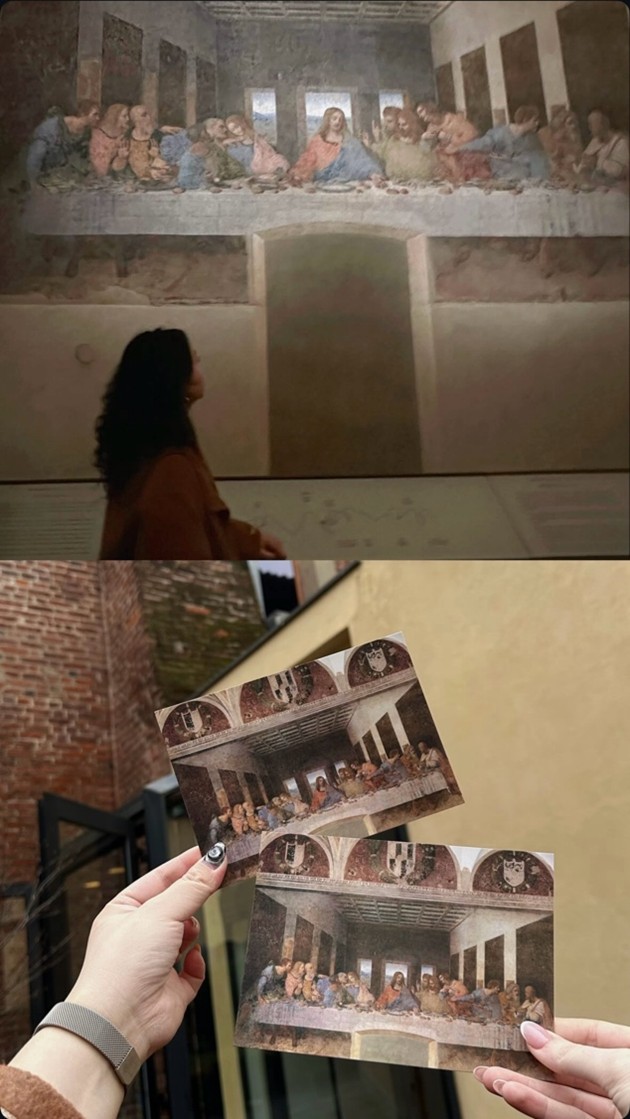 |
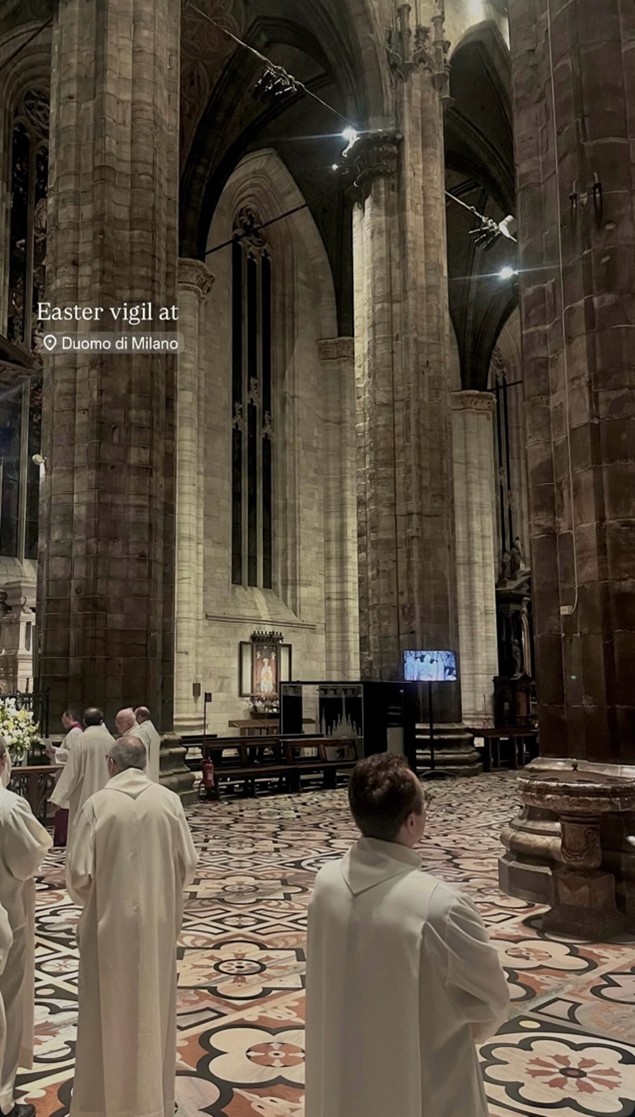 |
The Last Supper & Easter Vigils
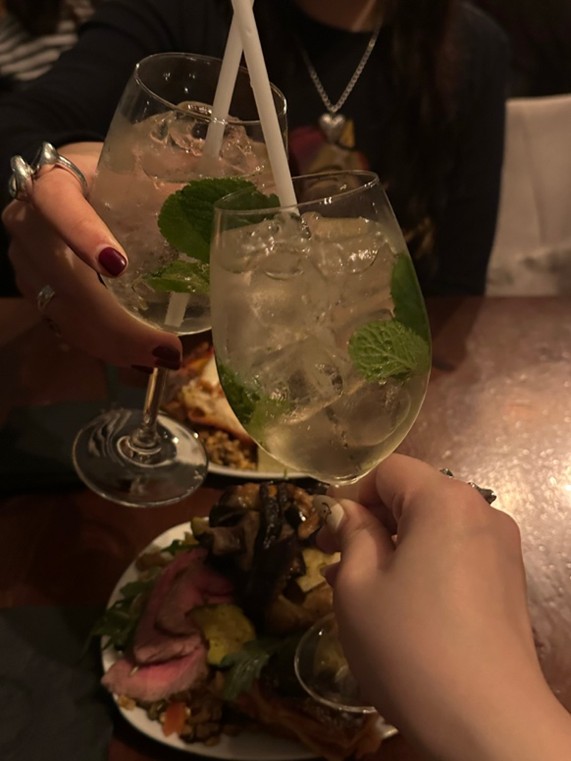 |
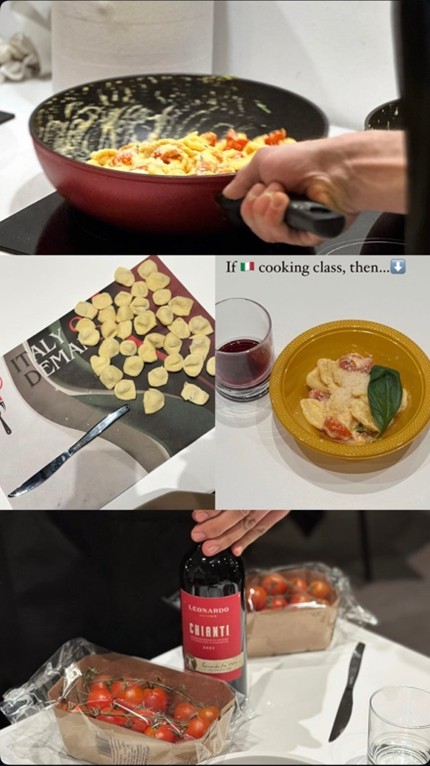 |
Aperitivo Culture & Italian Cooking Class
Travel
One of the biggest perks of exchange was how easy it was to travel. Milan’s location meant weekend trips were always just one spontaneous decision away. Within Italy, every Italian city I visited told a story about how regional identity still defines the country. Florence reminded me that Renaissance beauty was always tied to politics, Venice was filled with tourists from all over the world for its annual carnival, and Naples pulled me straight into Maradona’s legend and the neighbourhoods described in Elena Ferrante’s L’Amica Geniale series; worn down but bursting with the chaos of life. A very authentic Southern Italian experience is being dragged into a half-hour long conversation with our Airbnb host upon arrival and got a crash course on all the iconic food options we “must try” in Naples. Pompeii showed Roman’s everyday life paused mid-breath, as if time stopped right when the volcano erupted.
Beyond Italy, traveling north and east brought me face to face with Europe’s 20th-century transformations. Berlin is a living memorial bearing its scars but refusing to let them define the present. The walls are scrawled with graffiti, you rarely see people moving in groups in the streets, and techno beats spilling out of clubs that never seemed to close. Zurich carried all the traits you’d expect, very clean, efficient, and international. A short escape into the countryside of Switzerland made it clear how quickly life slows down once you leave the city. Hiking in the idyllic Creux du Van was like stepping into the set of South of Music. In Budapest, post-communist identity struggles are everywhere, from monuments to museums like the House of Terror, to the outer walls of apartment blocks still bearing faded socialist mosaics.
The Balkans were the most eye-opening. The geographical features were one of a kind, mountains folding straight into the sea and coastlines carved between steep cliffs. In Tirana, I saw a city moving quickly from isolationist past to a fast-developing future, with modernisation gaps visible everywhere. On the contrary, Montenegro is laid-back. Cats were everywhere in Kotor, on cobblestone alleys, restaurant chairs, hostel steps, and there seems to be a network of volunteers rescuing, sterilizing, and managing the stray cats in the city. Compared to the way the Balkans are often portrayed in Western media, what I experienced was humour, resilience, and hospitality — less “post-conflict fragility,” more a down the earth energy that reminded me of the early 2000s China, where fruit stands, budget clothing shops, and repair kiosks dotted every street.
The French Riviera gave me a sense of how culture and spectacle can be tools of soft power. The very concept of “Dolce vita” is something the region sells, with cities like Nice, Cannes, and Menton each adding their own piece to puzzle. Sorbets on white beaches under blue-striped umbrellas, markets selling fresh seafood and flowers, and a lifestyle that quietly advertises French ease and elegance. This exact image earns the Riviera a permanent place in the global imagination of luxury and leisure. In Monaco, the Grand Prix economy was the most famous example of nation-branding, proof that even microstates can shape global images. The harbour itself was part of the street racetrack and bumping into race car drivers while wandering along the docks wasn’t an imagination anymore
Tips & Tricks for Future Exchange Students
- Pre-departure Admin/Logistics
- Start early with paperwork. Visas, proof of enrollment, course selections always take longer than you think.
- Keep both physical and digital copies of key documents.
- Plan to buffer some time before classes start to familiarize with routing and your neighbourhood.
- Carry a small stack of printed passport-style photos. Universities, transport passes, and even gym memberships often ask for them on the spot.
- Budgeting
- Milan (and most of Europe’s hubs) aren’t cheap. Tracking expenses weekly really helped with budgeting and managing expectations.
- Setting aside a “travel pot” for weekend getaways is great as it helped with not overspending on daily living.
- Transit deals (with airlines & train lines), student discounts, and cooking at home during the week make a big difference.
- Book trains and plane tickets directly on their website, third-party apps often tack on fees. National rail sites are usually more economical, and many have English options.
- With a valid student card, there are often free or heavily discounted entry (especially for students under 26 years old) for museums and tourist attractions in the EU.
- Travel Strategy
- Being lost in a foreign city by yourself is perfectly normal.
- Budget flights have strict rules. Low-cost carriers (Ryanair, Wizz, EasyJet) are affordable, but they make their money on luggage. Invest in one cabin-size backpack that fits under-seat dimensions exactly, and you’ll save a fortune in fees.
- Always check local transport passes. Many cities like Vienna, Nice, Budapest, Berlin, offer 24/48/72-hoiur unlimited passes that cost less than buying individual tickets.
- For trains, buses, and ferries in certain countries, schedules are aspirational. Learning to adjust your expectations (and patience levels) saves a lot of frustration. Always give yourself buffer time when connecting transport.
- Sunday is a “closed day” in many countries. One of the biggest adjustments was learning that Sundays in much of Europe aren’t treated as another shopping day. Instead, most supermarkets, malls, and even pharmacies close entirely, with only the odd corner shop, train station kiosk, or café staying open.
- Carry small change for bathrooms. Public toilets in train stations or old towns often cost €0.50–€1, and card readers aren’t a given. A few coins in your pocket can save many awkward conversations.
- Cultural adaptability
- Be wary of strikes. Public transport, airlines, trains, even city services can be affected, often with just a few days’ notice (sometimes less). People simply rearrange their day or way of getting around. Walking, cycling, carpooling, or waiting it out in a café. The lesson here is to build flexibility into your plans: always check transport apps the day before, keep backup routes in mind, and avoid scheduling tight connections around travel days.
- Approach each new place with curiosity and humility. Learn the small unspoken rules from ordering food to the “right” way to greeting shopkeepers. A few words in the local language go a long way, even if you butcher the pronunciation. Sometimes, laughing at my own mistakes opened more doors than getting it right the first time.
- Volume matters. In certain settings, quiet conversation is the norm; in others, a bit of noise is just part of your surroundings. Matching the energy around you makes you blend in better.
- The lingering of cash culture. Even in big European cities, small bars, markets, and bakeries often prefer cash.
- Watch your body language. Hand gestures travel badly. Being observant goes a long way. Notice how locals communicate, use open and neutral
Closing
These frictions, learnings, laughs, tears, were exactly what I came for. I didn’t want a semester that felt like a slightly adventurous version of home. Before I landed in Milan, I wrote a to-do list of everything I thought I wanted out of the trip. Things as basic as getting a transit card or learning a few daily Italian phrases, both of which took far longer than they should have. In retrospect, the real lessons were never on that list.
What made it unforgettable were the people. The smart, hilarious, generous, and warm friends who turned getting lost on trams, sprinting to 8 a.m. classes, or even waiting for the elevator into our own running jokes. On the road, I crossed paths with people just as memorable, a Canadian high school student who was backpacking across Italy, a Berliner perfume shop owner who would cycle off to his night gig as the cicerone at a local craft beer bar, a Montenegrin uncle who poured rakija like it was water. Every one of them left me with a story to carry forward. I still remember the chat I had with travellers outside an Irish bar in Vienna on St. Patty’s. It was about a reminder that seeing the world is not just about where you go, but how you learn to live in it: by sharing narratives, spaces, and viewpoints with people you may never see again.
Exchange gave me more than I thought I was looking for. I cherish those fleeting encounters with strangers, but what I feel even luckier about are the friends who were willing to climb a mountain with me at 3 a.m. in Kotor to catch the sunrise, sing their hearts out at a hostel karaoke night in Florence, barbecue together at a villa in Malta, or sprint through the streets of Prague with twenty-pound backpacks so we wouldn’t miss a connecting bus, and countless other memories I can’t even finish listing. I’m also grateful that in places so far from home, I found people who were interesting, soulful, and willing to listen and simply be there for one another. Through them, I saw again the qualities I’ve always loved in people and realized how those very qualities can bring out the best in me too.
Everyone has their own moment that sums up exchange. For me, it was less about big highlights and more about all the fumbling, the figuring it out, and the eventual ease of finding my place. I came back with a maxed-out camera roll and a bag full of postcards and magnets, but the real souvenirs were the people I can now pick up the phone and call across time zones.
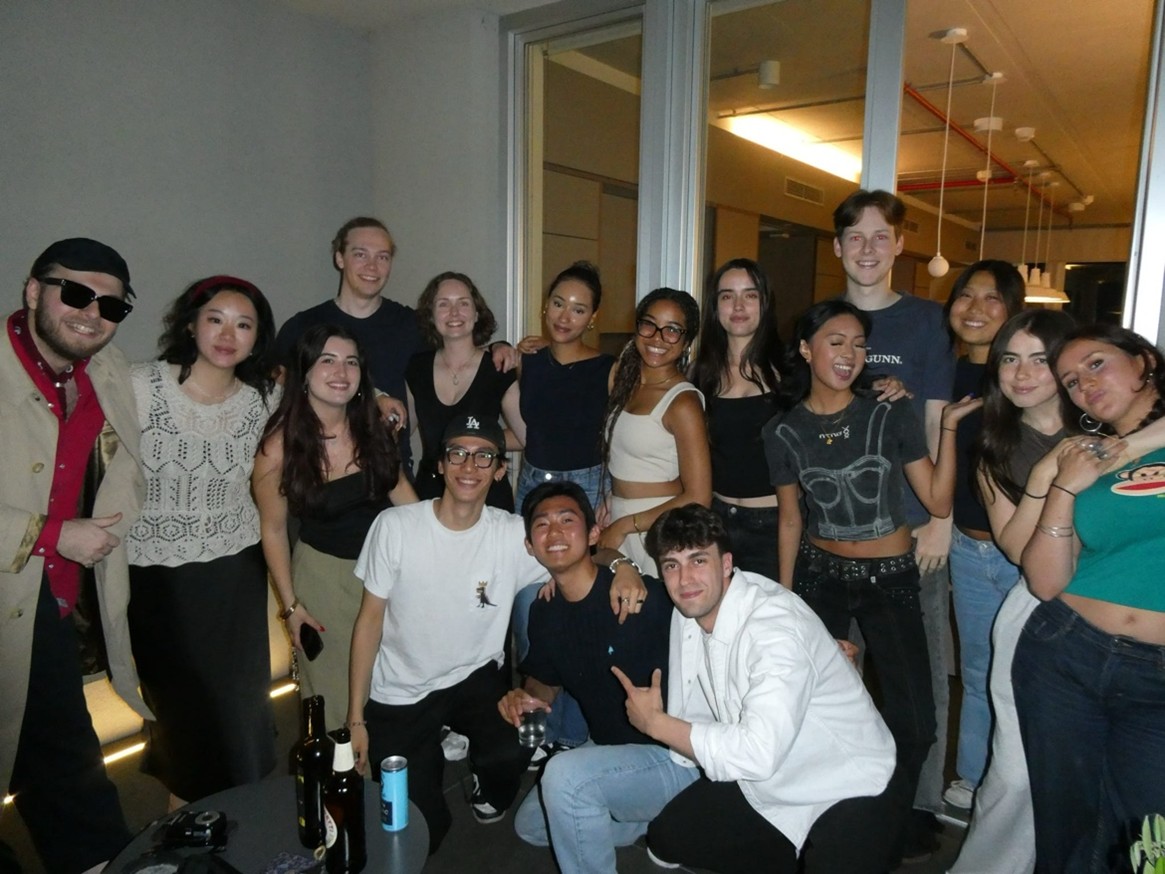
Friends
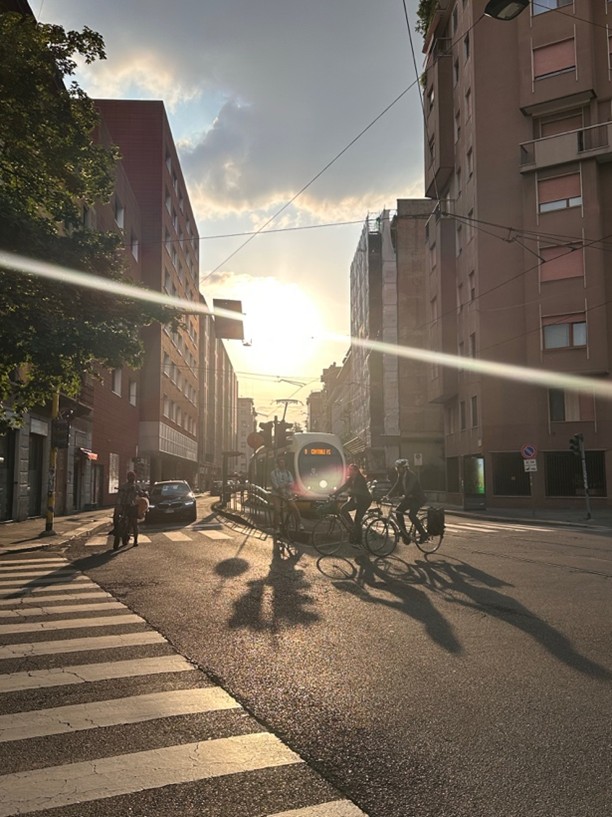 |
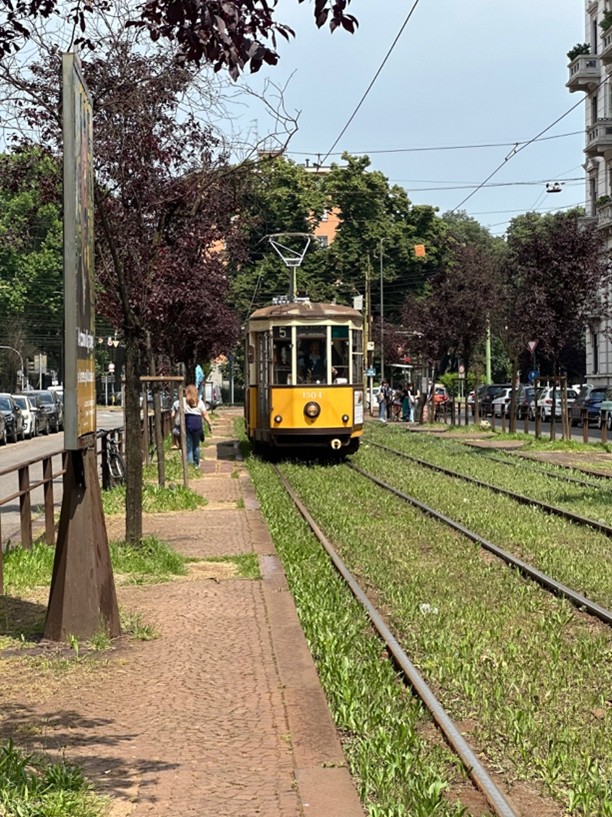 |
Life in the City
This past May, we had the chance to study abroad in Belgium through the Western-Windsor EU Study Abroad Program. We found out about this opportunity through the IR program and Western International, and are so fortunate to have professors who encouraged us to apply.
Over two exciting weeks, we were guests at major institutions such as the European Commission, Council, Parliament, NATO Headquarters, and the European External Action Service, and met directly with diplomats, policymakers, and journalists. We discussed the EU’s role in facing today’s global challenges, from AI and migration to climate and the war in Ukraine. Between briefings, we explored Brussels, Brugge, Leuven, and Antwerp, and even ventured past Belgium into nearby countries such as the Netherlands and France, making amazing memories along the way.
One of the best parts? This trip brought everything we have been learning in the International Relations (IR) program at Western to life. With knowledgeable and dedicated faculty, a strong curriculum relevant to current global affairs, the close-knit community among IR students, and so many ways to connect theory with what’s happening in the world, the IR program gave us the context, tools, and the curiosity to make the most out of every insight we gained abroad.
The IR program at Western is truly something special, and we are immensely grateful to be a part of a program that has provided us with these opportunities, both at home and abroad.
Tessa’s comments:
“Having studied the institutions we visited during this program in-depth, and getting to hear firsthand from the decision makers I had only read about was truly a full-circle moment. The connection I got to make between classroom theory and lived-experience was incredibly rewarding, and I am hugely grateful for the IR program at Western for equipping me with the breadth of knowledge necessary to make the most out of this experience. I recommend any IR student passionate about global affairs and wishing to complement their classroom studies to jump on this once-in-a-lifetime opportunity.”
Zaina’s comments:
“Visiting institutions such as NATO and speaking with diplomats who shape global policy was one of the most impactful experiences of my undergraduate education. The IR program at Western is so much more than lectures and assignments. We have such a close-knit, passionate group of students and some of the most supportive professors you could ask for, who push us to go after experiences like this. I’m reminded every day that I chose the right program. To any student curious about how the world works: study IR at Western. You won’t regret it.”
Helen’s comments:
“It’s one thing to read about institutions as crucial to global governance as the EU. It’s another thing entirely to experience it. Meeting directly with global leaders in diplomacy, policy, journalism, and academia has been an education like no other. I am beyond grateful to the IR program and faculty at Western for connecting me with these opportunities to enrich my learning, and for their support and encouragement as I continue to expand my understanding of global affairs.”
|
from left to right, Zaina Butt, Helen Li, and Tessa McDermid at NATO Headquarters |
Zaina Butt and Tessa McDermid at the European Commission |
Tessa McDermid and Zaina Butt with Former US Ambassador to Belgium, Dirk Wouters |
|
Helen on travels around the European Continent, post-Study Abroad |
Zaina after climbing 366 steps to the top of the Belfry Tower of Bruges, a historical watchtower and treasury |
Tessa outside of the Brussels Royal Military Museum, a short walk from the EU institutions we visited. |
|
Stadhuis Leuven, a mere 5-minute walk from the Irish College where we stayed. The building survived the devastation of Leuven during WWI and escaped with minor damage after WWII |
||
During my semester abroad, I was also selected to attend the 2025 NATO Youth Summit. I got on a flight to Budva, Montenegro, and made some of the best memories of my life while having the chance to network with incredibly intelligent people while exploring the beautiful landscapes of Montenegro.
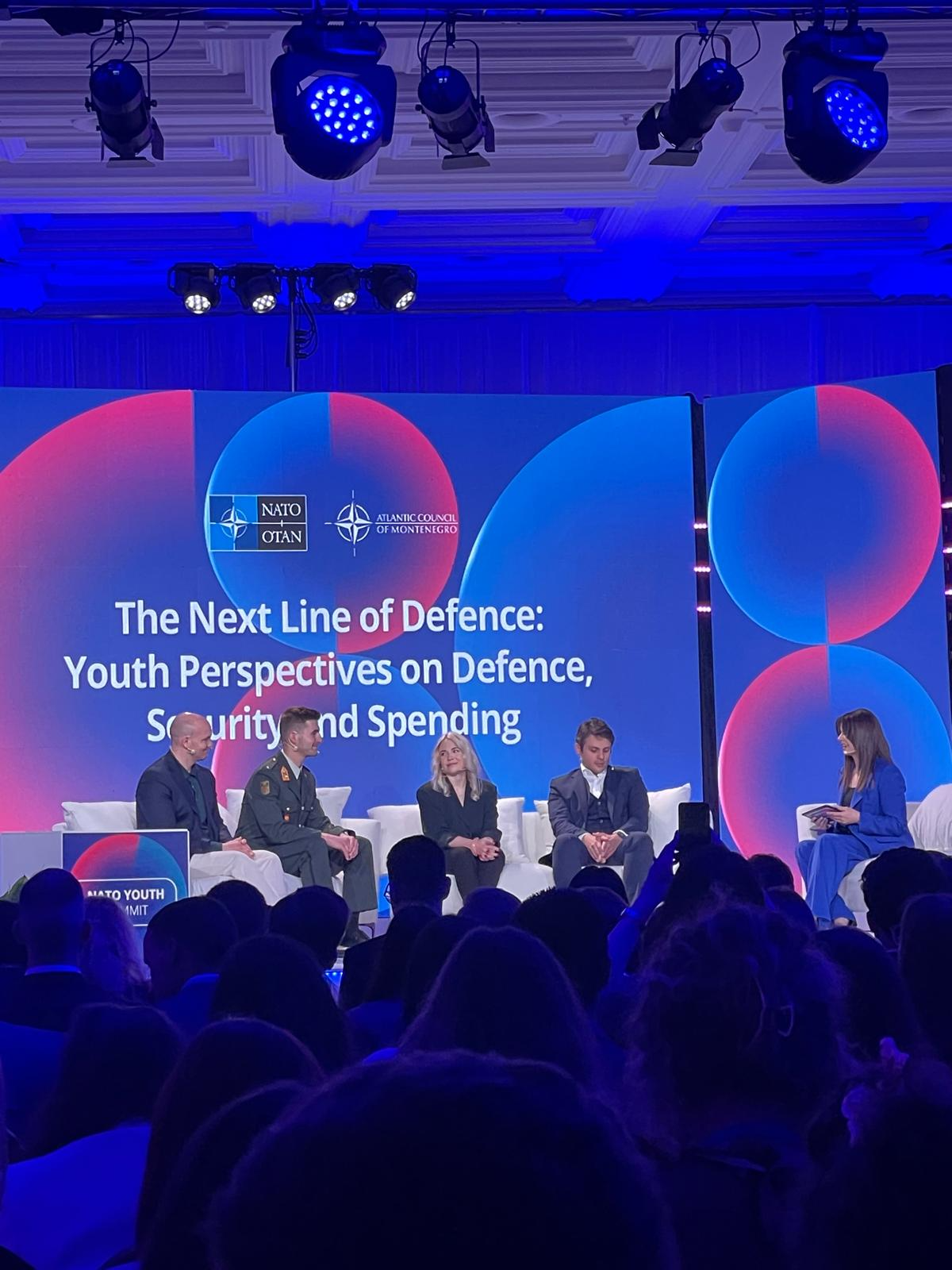 |
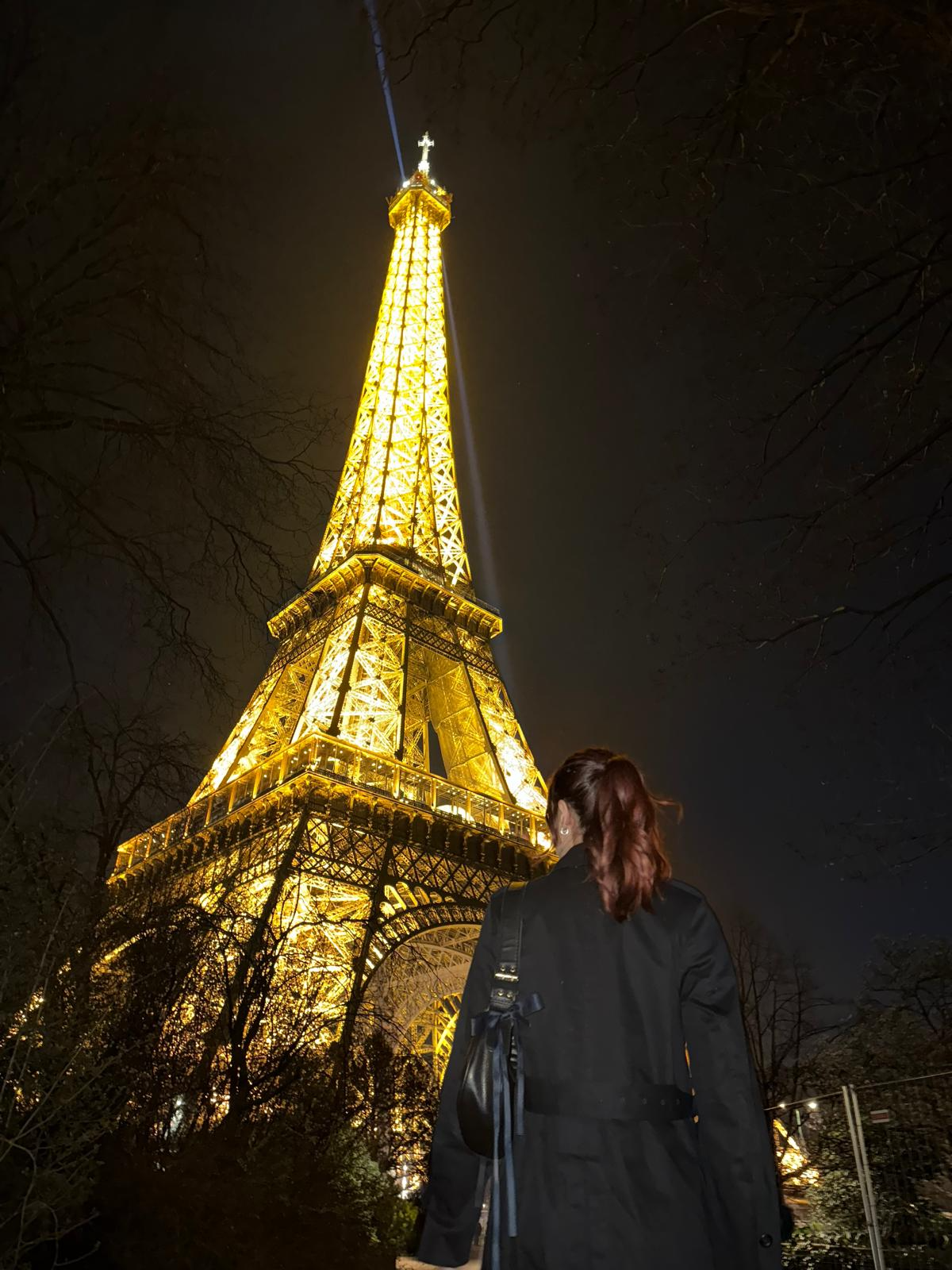 |
Past Exchange Experiences
In the winter term (2016) I left to go on exchange to Paris to Sciences Po. I chose this university because it specializes solely in Social Sciences and it has been ranked the 13th best university in the world for Social Sciences. At first, moving to France was quite a change but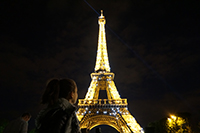 this experience was by far the best I’ve ever had. From walking along the Seine River to eating fresh croissants every day, I got to fully immerse myself in the French culture. One of my favorite courses on exchange was on the Rwanda Genocide. As a part of the course, I got to hear a testimony from a women survivor of the genocide and I was able to go to a Rwanda genocide trial that was happening in Paris. I was able to meet and make friends with people from Australia, Austria and Mexico and through budget airlines, I was able to see a large chunk of Europe. I would encourage everyone to go on exchange because it truly ends up being an unforgettable experience; one in which memories will last a lifetime.
this experience was by far the best I’ve ever had. From walking along the Seine River to eating fresh croissants every day, I got to fully immerse myself in the French culture. One of my favorite courses on exchange was on the Rwanda Genocide. As a part of the course, I got to hear a testimony from a women survivor of the genocide and I was able to go to a Rwanda genocide trial that was happening in Paris. I was able to meet and make friends with people from Australia, Austria and Mexico and through budget airlines, I was able to see a large chunk of Europe. I would encourage everyone to go on exchange because it truly ends up being an unforgettable experience; one in which memories will last a lifetime.
I spent my third year studying abroad in Grenoble, France, a city in the Alps about an hour from Lyon. I received a Certificate in Political Studies from the Grenoble Institute of Political Studies, one of 9 Sciences-Po campuses across France.
I studied in Grenoble as one of 50 Ontarian students participating in the Ontario Rhone-Alpes (ORA) Exchange Program, a regional exchange program between the provinces of Ontario and Rhone-Alpes. I would highly recommend any student with a good level of French to consider applying for the ORA Program – as it is a government program, there are specific scholarships for all participants that make studying abroad a lot more affordable.
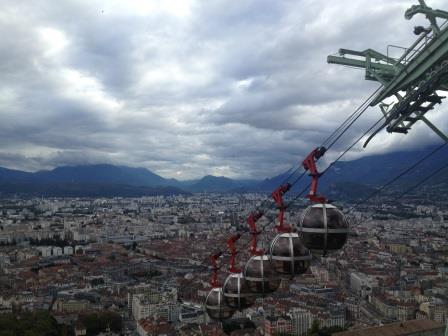 My exchange experience was incredibly beneficial to my degree. I followed a combination of courses in history, political science, international relations and law, all instructed in French. Participating in seminar courses broadened my horizons through offering unique opportunities to hear European opinions on international issues. It was also great to have a whole new set of courses to choose from outside of the courses offered by Western – I was able to take in-depth specific courses about the European Union, the Arctic and Arabic politics that weren’t all offered by Western. Studying in French also greatly improved by language skills and confidence speaking in another language.
My exchange experience was incredibly beneficial to my degree. I followed a combination of courses in history, political science, international relations and law, all instructed in French. Participating in seminar courses broadened my horizons through offering unique opportunities to hear European opinions on international issues. It was also great to have a whole new set of courses to choose from outside of the courses offered by Western – I was able to take in-depth specific courses about the European Union, the Arctic and Arabic politics that weren’t all offered by Western. Studying in French also greatly improved by language skills and confidence speaking in another language.
Before participating in an exchange, ensure that you will be able to exchange the credits for the courses you participate in abroad for Western credits. The process is a little complicated and might be frustrating, but it definitely pays off in the long run for the incredible experience you will have abroad.
I spent my third year in Tuebingen, a small university town located in southwestern Germany. I studied International Relations and pursued a minor in German Studies. In this quick summary, I will discuss the compatibility of the University of Tuebingen and Western University in terms of history and political science credits.
It is very difficult to plan ahead which classes you will be attending during your year abroad because the academic calendar changes continuously. This means that you will have to get your 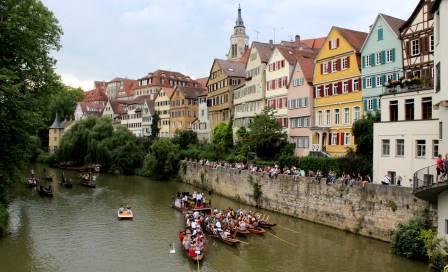 courses approved while you are in Germany; excellent communication with your undergraduate chairs and academic advisors is therefore crucial. All political science classes that I selected were taught in English and there were plenty of fascinating courses to choose from. Western approved all of them and I had no problems in this department. The only problems that I had were concerning my history credits. All history classes in Tuebingen are taught in German and only a few of them fit the International Relations module at Western. I only studied German for two years in university before moving to Germany; this is usually the level that is recommended to exchange students. Fortunately, I was able to take my exams in English and my grades did not suffer much. You should also be aware that Western makes some exceptions for exchange students. This means that you can take some history classes that are specific to your exchange country, in this case German history, even if they would not normally fit the International Relations module. This makes choosing classes much easier because, unfortunately, the history department at Tuebingen University does not offer as many history courses as Western.
courses approved while you are in Germany; excellent communication with your undergraduate chairs and academic advisors is therefore crucial. All political science classes that I selected were taught in English and there were plenty of fascinating courses to choose from. Western approved all of them and I had no problems in this department. The only problems that I had were concerning my history credits. All history classes in Tuebingen are taught in German and only a few of them fit the International Relations module at Western. I only studied German for two years in university before moving to Germany; this is usually the level that is recommended to exchange students. Fortunately, I was able to take my exams in English and my grades did not suffer much. You should also be aware that Western makes some exceptions for exchange students. This means that you can take some history classes that are specific to your exchange country, in this case German history, even if they would not normally fit the International Relations module. This makes choosing classes much easier because, unfortunately, the history department at Tuebingen University does not offer as many history courses as Western.
I hope that this information will be useful to you. Good luck on your exchange!
In 2012-2013, I was fortunate to participate in Western’s international exchange programme in both France and the Netherlands. To say the least, the past year was unbelievable! I studied a broad range of subjects concerning International Relations, African studies, European politics, American foreign policy, British history and French. In my first semester, I was at the Université François-Rabelais in the Touraine, a region known for its wines, pure French and quaint châteaux. During my second semester, I studied at RadboudUniversiteit in Nijmegen, the oldest city in the Netherlands. While on exchange, I had ample days filled with adventure and knowledge; acquired a greater capacity and confidence in speaking French; and met with many inspiring individuals from all over the map who I now call my good friends. I made sure to also engage in a variety of out-of-classroom experiences, such as the Model European Council in Belgium and the NATO International Spring School in the Transylvania region of Romania, both of which complemented my education by stretching my thinking with new learning.
To read about the benefits of international study, particularly as they relate to the development of people’s careers after they have completed university, go to:
Aaron Pinto, a graduate of the IR program (2014), is featured.
I had the privilege of spending my third year abroad studying in Pune, India, a big city about three hours south of Mumbai. I studied in Pune through the Ontario-Maharashtra-Goa (OMG) Exchange Program, an organization that sends students from Ontario to select Indian universities, while allowing students from India to come to Ontario to study. All students participating in the exchange receive a stipend from the program to help with the costs of exchange. As a student going from Canada to India you receive a $2500 stipend, which goes a long way since the cost of living is much lower in India. This was extremely helpful and allowed me to travel around India and other South Asian countries throughout the year!
During my time at Pune University I took courses from the Politics Department, the History Department, and the Defense and Strategic Studies Department. The courses were taught in both English, and the local Indian language, Marathi. All my courses were approved and will count towards my degree, however the process of selecting courses was tricky because the university doesn’t post available courses online. I had to wait until I arrived in India to choose my courses from bulletin boards posted in each department that had the available courses for that semester. The course selection process was stressful, especially being from the IR department at Western, because there isn’t a huge variety of courses to take at Pune University, and many of them don’t fall under the eligible course list for the IR module. The professors are very flexible and helpful and in the end all my courses transferred over.
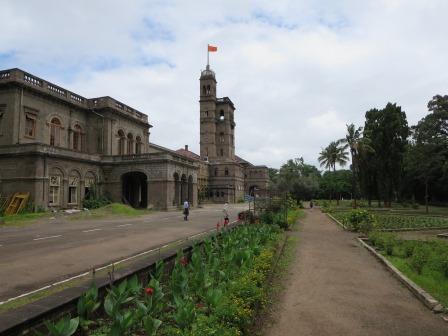 My exchange experience in India was extremely hard and frustrating at times, but it was an incredible learning experience that allowed me to live outside of my comfort zone and gain international experience that is useful for a student studying IR. I was able to live and study in an environment that was completely different from anything I’ve ever experienced before. The OMG exchange program allowed me to learn about international relations not just inside the classroom, but outside the classroom as well, in a highly educational international experience.
My exchange experience in India was extremely hard and frustrating at times, but it was an incredible learning experience that allowed me to live outside of my comfort zone and gain international experience that is useful for a student studying IR. I was able to live and study in an environment that was completely different from anything I’ve ever experienced before. The OMG exchange program allowed me to learn about international relations not just inside the classroom, but outside the classroom as well, in a highly educational international experience.
I spent the second semester of my third year studying at Francois Rabelais University in the city of Tours, France (about two hours south of Paris). During my time there I studied a variety of different subjects including French translation, American studies and International Relations. Being able to take electives abroad in a Pass/Fail system allowed me to broaden my horizons and challenge myself by studying in new fields. During my time there, I lived in a mixed residence with French and exchange students from a variety of different backgrounds. This experience was valuable to me as it provided me the opportunity to interact daily with different people from a variety of different cultural backgrounds.
This experience was beneficial to my learning in International Relations as it allowed me to study outside of Western for a period and exposed me to other institutions’ methods for learning and approaches to IR scholarship. I also was able to study under professors from the United States, Germany and France and gained insight from a perspective other than a purely Canadian outlook. My courses were taught in English but there was opportunity to participate in the CUEFFEE language school at the University to practice oral and written French in bi-weekly classes.
I would encourage students to do as much of the logistical organization for course transfer credits before departing for their chosen destination, and potentially to enroll in an extra course-load in the semester preceding and following the exchange. While this may not be necessary and the entirety of the course-load may transfer back, it was very beneficial to be able to study as many electives as possible during my time abroad, and allowed me to maximize my experience and exploit the pass/fail nature of credits received abroad.
